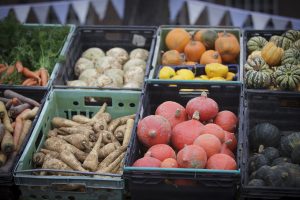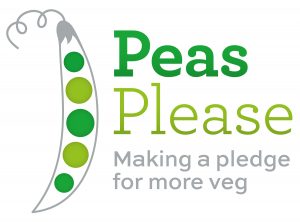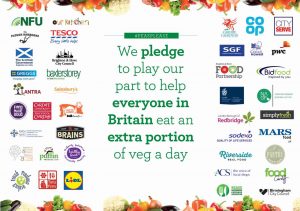 With talks of ‘Healthy January’ and ‘Veganuary’ all over social media, one could expect that our diets were healthier than average at the start of 2018. Well, if judged by the amount of fresh veg we bought throughout January, this assumption is soon refuted: sales of veg were down by 2% compared with last year.
With talks of ‘Healthy January’ and ‘Veganuary’ all over social media, one could expect that our diets were healthier than average at the start of 2018. Well, if judged by the amount of fresh veg we bought throughout January, this assumption is soon refuted: sales of veg were down by 2% compared with last year.
A few weeks ago, the Peas Please Strategy Board met to discuss the business case for veg. In this occasion, Simon Parnell, UK Retail Director at Kantar WorldPanel, the company that monitors retail sales in the UK, gave us some intel into the groceries market.
While Healthy January did not translate into higher veg sales, meat-free ready meals sales were up by a staggering 15%, and vitamins by 12%. Our increased appetite for vegetarian meals is a good sign: a lot of attention has been given to the negative environmental and health impacts of too much meat consumption and people are responding and moving towards meat-free options. How much veg those ready meals contain, is unknown. Higher vitamins sales could be linked to the nasty viruses that affected so many of us at the beginning of the year, as we sought boosts for our immune systems in various capsules.
Yet, vegetables are health champions. While experts and public health campaigners often refer to their long-term health benefits such as protecting us from cardiovascular disease, and several types of cancer; veggies are also great shorter-term health boosters. Veg are rich in nutrients, such as vitamins A, C, and E, iodine, zinc, iron, and selenium, which are critical for a well-functioning immune system.
So where is the missing link? Is it a lack of awareness of these health benefits? Missing cooking skills? Or is it about convenience? Price? Appeal?
It is most likely a mix of all these reasons; so concerted efforts across the public, private, and third-sector will be key to shift the needle. We need effective education campaigns, more and better marketing and advertisement for vegetables, and interventions in the retail and out of home sectors to make veg the easy choice.
The good news is that almost all of us do buy veg, and there are opportunities for growth in the fresh produce aisles. Retailers need to step up to the plate to tackle the real and perceived convenience, price, and appeal barriers of veg. They won’t lose out: evidence shows veg is good for business.
Simon revealed that 97% of shoppers buy veg every month, and we buy them quite frequently, 1.5 times per week, but our choices are very limited, we buy on average only a fifth of the variety on offer. We also only get 2% of veg on multi-buy promotions, one of the lowest shares of all food categories.
Promotions such as ‘mix and match’ offers, in-store tastings, and recipe cards, and smart placement, for example grouping ingredients for meals, could tempt us into buying more, and more diverse produce. Widening our veg preferences would not only be good for our health, it is likely to increase sales of profitable ‘fancier’ veggies: those with a higher margin than our usuals.
Another area of opportunity lies in the prepped section. Prepared veg, whether for cooking, or snacking, solve the inconvenience barrier, making it easy for people to cook with veg, while adding considerable value to the category; and there is considerable scope for growth in this sector.
In October 2017, Tesco, The Co-op, Sainsbury’s, and Lidl pledged to play their part to help everyone eat an extra portion of veg per day. Together, these retailers account for 55% of the groceries market in the UK, so that’s a good start, but as the evidence piles up for the health and business case for more veg, we hope that more retailers will come on board and that the sector as a whole will truly up its game.
Beyond retail, there is a lot the food industry could and should do to tackle the negative bias against veg. Peas Please is leading on this front with our campaign for a Veg Ad Fund. The public and third-sector also need to participate in this big push and refresh for veg, and Peas Please encourages them to work together as Veg Cities to promote veg consumption in city-wide initiatives. And of course, the out of home sector is key, and so Peas Please is working closely with contract caterers, restaurants, and other food service businesses to develop pledges for more veg in the out of home.
You can sign up to Peas Please updates here 
